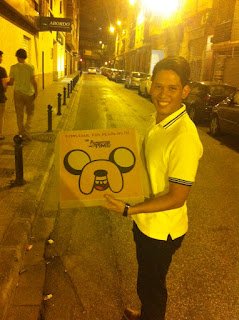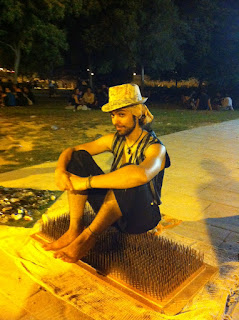(a Texan, a Panamanian, and a Honduran fix their hair...)
A diverse group of people walk into a bar… Had I any skill
in drawing, there would be a nice little political cartoon to go along with
that sentence, but unfortunately it’s hard to draw diverse stick figures. If
you don’t understand my point (here comes my mini rant blog): it’s that diversity,
globalization, starting a conversation, having this discussion, are
unfortunately becoming meaningless buzzwords. During the past few years, I’ve
taken to doing homework at Starbucks (and perhaps developed a bit of an addiction
to the brown stuff). As basics sip their pumpkin spice lattes, soccer moms
their frappes, and hipster writers order their espresso; those words are thrown
back and forth across the room like a game of thrones. (I originally meant to
write ‘game of badminton’, but ‘game of thrones’ came out, the season 5
finale…dude.) The sort of shallow definition for these words, the meaning that
I hear as I work through fluids homework, is like something from a Buzzfeed
article.
Diversity –
not white people
Globalization
– call centers in India
Starting a
conversation (discussion) – what people with power say after a tragedy
That’s how most people (well, most people at Starbucks) tend
to think, and whoever can use the terms often enough in their job interview
wins!
And thus ends my cynical rant.
The point to all of that being that that is how I thought of
those buzzwords for the last few years until I came to Spain. Working (if even
on a small segment) on a large interdisciplinary research project at a Spanish
university showed the power behind words like diversity and globalization
(conversation, I’m still not sure on). Three guys from our group of six, plus
me, are working in the electrochemistry lab at UPV on a massive, multifaceted
(eh?) project. For those of y’all who are unaware, I am a civil engineering
major. So why are the majority of participants in a civil engineering research
program working in an electrochemistry lab?


That was my question when, during
our first week, Dr. Juan Soto a chemistry professor at UPV, gave the four of us
a 2 hour lecture on the basics of corrosion theory and electrochemistry. In
Spanish. Luckily two of the guys in our group are fluent and could translate.
But for anyone who’s never had a lecture in a foreign language, I suggest you
go to one if ever you have the means. It certainly changed my perspective (or I
had a “paradigm shift”, if this was 2005) on the way we learn, and how I am
likely to approach my classes post trip. With Carlos translating, Dr. Soto
painted a brilliant picture of corrosion mechanisms, and how to quantify them.
The fact that his lecture was in Spanish and getting his words through another
person meant that an intense level of focus was required, and as such, I felt
that I learned as much in two hours as two semesters of general chemistry.
(some of the mentors at a UPV science fair this week)
What
I didn’t realize for several days after the lecture, as we were working with
civil engineering professors and grad students to measure rates of corrosion
within reinforced concrete and how to slow and stop corrosive ions, was that
learning the subject first from a scientist’s perpective, as opposed to an
engineer’s, got me up to speed on this ongoing project much more quickly, and
as a result I have (for the most part) fully understood everything we are
working on and where this project is headed. A diversity of backgrounds, from
chemistry to structural engineering to material science, is where this research
stems from and the only way to study such a specific topic. The technical
papers and books we reference, were published in Europe and America, with authors from
around the world. Some tests use the RILEM standard (European) while others use
ASTM standards (American). The new tests they are developing is a hybrid of the
two. And then there are the people. Juan Soto and Jose Gandia are the guys in
charge, a chemist and a building engineer, one looks the part of distinguished
professor and one looks like he just got back from surfing. From there we have
Rafa, the oldest guy there and definitely the most loved, he doesn’t speak any
English but makes me laugh on a daily basis. He even gave us a bottle of
champagne our first week! And of course there is Jose Enrique, who looks like
he just came to the lab from a heavy metal concert. A diverse group of people,
from diverse backgrounds, using information obtained on a global scale for a
genuine purpose. In this I have found a truer meaning for these “buzzwords.”
What I can’t wait to take back to the states is the way we
acquire information when working at UPV. Dr. Gandia gave us a brief overview on how he expected research to be conducted, and spoke about “lines of
research.” Meaning, let’s look at the sources for this paper, if there is a
specific thing we need more information on, let’s follow that source. And then
do the same thing to that paper, and so on and so forth. I’m sure this is a
pretty common means of study in higher academia, but it was a method never
before shown to me. And using this, I feel I have a very complete picture of
the macro while still knowing the ins and outs of our specific tasks. I know
that this, more than anything else learned on this trip, will help me to
achieve success in grad school and beyond.
Now let me diverge for a moment and talk about Granada.
Granada. To say it’s like something from a storybook or a
Disney movie would be insulting to the city. This thousand years old city, the
last Moorish stronghold till 1492, is incredible. Overlooked by the snowcapped
Sierra Nevada, this city sits upon three steeply sloped hills, and gave my roommate
and I a double dose of history and culture last weekend. I knew at once it was
going to be an interesting weekend when, on Friday afternoon, a very French man
(long curly hair in a ponytail, chain smoking cigarettes, driving an insanely
tiny car) met Carlos and I at a gas station to give us a ride from Valencia.

Windows down, and Spanish jams a-blasting, we started our journey. The drive to
Granada was one of the most surreal experieces of my life, there is no I-35
esque highway connecting Valencia to Granada, so we took (for lack of a better
term) the scenic route. And scenic it was, in four hours we went from costal
cityscape, to large hills, to flatlands and a semiarid region that was a little
like New Mexico, and then through rocky mountains and pine wood forests, before
sloping down into the valley that holds Granada. I got to see a lot of Spain that
day, orchards that ranged from growing olives to
oranges. I got to see castles and cathedrals and gypsy caves. Yet Granada has definitely
set the standard in Spain on castles, cathedrals, and gypsy caves. It was kind
of nice to play the tourist for a weekend, of which Granada is crawling, and
tour the Alhambra, see flamenco shows, and of course, eat my weight in Tapas.
The Moorish influence is still very present in the city, while the Catholic
influence is just as strong. These polarizing cultural forces create a
beautiful contrast that gives Granada a certain uniqueness in its overall vibe.
Basically, the coolest place I’ve ever been.




(so much Tapas!)
After such a life changing weekend, coming back to
Benimaclet in Valncia, and going to work on Monday morning felt a bit…mundane.
Which is insane because I live in an apartment in Spain within walking distance
of the Mediterranean! Last weekend’s experience, as well as this entire trip as
a whole, has shown me that just finding a job that gives a nice paycheck is
simply not enough. I’ve been bitten by the travel bug, and bitten hard. I hope
to work for a global organization that provides travel opportunities, utilizes
all types of disciplines, and even has…a diverse workforce.
(while Granada may be grand, Valencia has its charms too, like free adventure time pizza!)





















